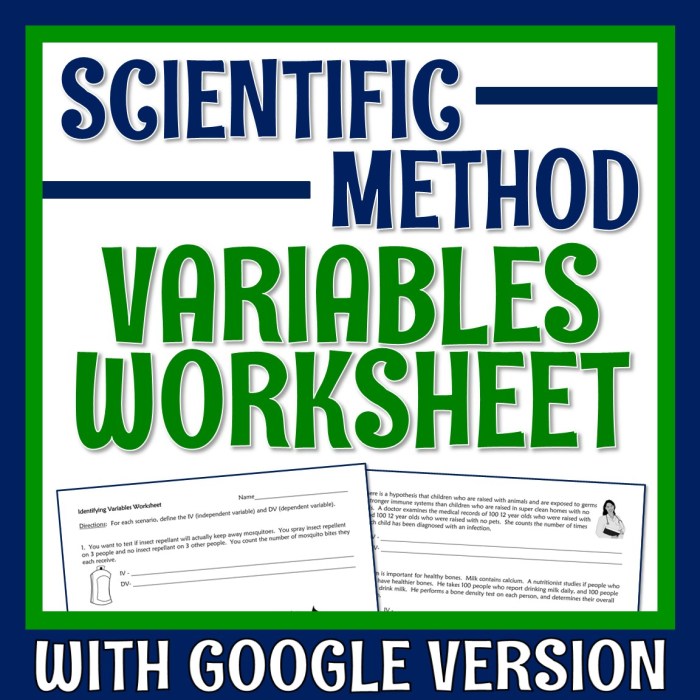Introducing the experimental variables worksheet answers key, an invaluable resource for students and researchers seeking to delve into the intricacies of scientific experimentation. This comprehensive guide provides a thorough understanding of experimental variables, their role in hypothesis development, experimental design, data analysis, and reporting, empowering individuals to conduct and interpret scientific experiments with precision and confidence.
Throughout this exploration, we will uncover the significance of controlling variables, the benefits of random assignment, and the statistical methods employed to analyze experimental data. By the conclusion, you will possess the knowledge and skills necessary to navigate the complexities of experimental variables, enabling you to design, execute, and report scientific experiments with the utmost accuracy and effectiveness.
Experimental Variables

Experimental variables are variables that are manipulated or controlled in an experiment to test a hypothesis. They are classified into three types: independent, dependent, and controlled variables.
Independent variablesare variables that are manipulated by the experimenter to test the hypothesis. They are the variables that the experimenter changes or controls to see how they affect the dependent variable.
Dependent variablesare variables that are measured in an experiment to see how they are affected by the independent variable. They are the variables that the experimenter observes to see how they change in response to changes in the independent variable.
Controlled variablesare variables that are kept constant in an experiment to ensure that they do not affect the results. They are the variables that the experimenter controls to ensure that they do not confound the results of the experiment.
Hypothesis Development
Experimental variables play a crucial role in hypothesis formulation. The independent variable is the variable that is manipulated to test the hypothesis. The dependent variable is the variable that is measured to see how it is affected by the independent variable.
The controlled variables are the variables that are kept constant to ensure that they do not confound the results of the experiment.
For example, if a researcher wants to test the hypothesis that fertilizer increases plant growth, the independent variable would be the amount of fertilizer applied, the dependent variable would be the height of the plants, and the controlled variables would be the type of plant, the amount of sunlight, and the amount of water.
Experimental Design
Controlling variables is essential in an experiment to ensure that the results are valid. If variables are not controlled, it is difficult to determine whether the independent variable is the cause of the change in the dependent variable.
Random assignment is a technique that is used to control variables in an experiment. Random assignment ensures that each participant in an experiment has an equal chance of being assigned to any of the experimental conditions. This helps to ensure that the groups are comparable and that the results are not confounded by other variables.
Data Collection and Analysis, Experimental variables worksheet answers key
Collecting and organizing experimental data is essential for analyzing the results of an experiment. The data should be collected in a way that is accurate and reliable. It should also be organized in a way that makes it easy to analyze.
Statistical methods are used to analyze experimental data. These methods help to determine whether the results of an experiment are statistically significant. Statistical significance means that the results are unlikely to have occurred by chance.
Reporting Results
An experimental report is a document that describes the results of an experiment. The report should include a clear statement of the hypothesis, a description of the experimental design, a summary of the data, and a discussion of the results.
Interpreting and presenting experimental findings is an important part of the research process. The findings should be presented in a clear and concise manner. The researcher should also discuss the implications of the findings and suggest future directions for research.
Questions Often Asked: Experimental Variables Worksheet Answers Key
What are the different types of experimental variables?
Experimental variables are classified into three main types: independent variables, dependent variables, and controlled variables.
How do I control for confounding variables in an experiment?
To control for confounding variables, researchers employ techniques such as randomization, matching, and blocking, ensuring that the effects of these variables are evenly distributed across experimental groups.
What statistical methods are used to analyze experimental data?
Common statistical methods used to analyze experimental data include t-tests, ANOVA, and regression analysis, providing insights into the relationships between variables and the significance of experimental findings.